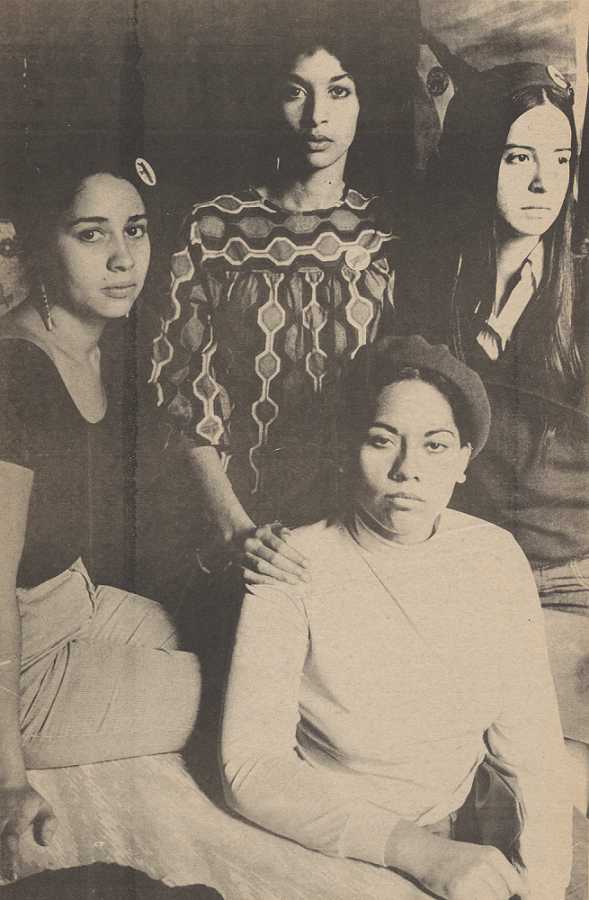Document Text |
| Excerpt from the Young Lords 13-Point Program before the Women’s Caucus submitted their demands. |
| 10. WE WANT EQUALITY FOR WOMEN. MACHISMO MUST BE REVOLUTIONARY. . . NOT OPPRESSIVE.
Under capitalism, our women have been oppressed by both the society and our own men. The doctrine of machismo has been used by our men to take out their frustrations against their wives, sisters, mothers, and children. Our men must support their women in their fight for economic and social equality, and must recognize that our women are equals in every way within the revolutionary ranks. FORWARD, SISTERS, IN THE STRUGGLE! |
“Young Lords Party 13 Point Program and Platform” Palante, September 25, 1977. Pages 22, 23, and 24. Tamiment Library / NYU Archives.
Document Text |
| Excerpt from the Young Lords 13-Point Program after the Women’s Caucus submitted their demands. |
| 5. WE WANT EQUALITY FOR WOMEN. DOWN WITH MACHISMO AND MALE CHAUVINISM.
Under capitalism, women have been oppressed by both society and our men. The doctrine of machismo has been used by men to take out their frustrations on wives, sisters, mothers, and children. Men must fight along with sisters in the struggle for economic and social equality and must recognize that sisters make up over half of the revolutionary army: sisters and brothers are equals fighting for our people. FORWARD SISTERS IN THE STRUGGLE! |
“Young Lords Party 13 Point Program and Platform” Palante, September 25, 1977. Pages 22, 23, and 24. Tamiment Library / NYU Archives.
Background
The Young Lords Party (YLP) of New York formed in 1969. It was inspired by the Young Lords Organization of Chicago, which was inspired by the Black Panther Party. The Young Lords were revolutionary political activists fighting for the liberation of Puerto Rican people. Shortly after the YLP took shape, two members of the all-male leadership team created a 13-point program. This document articulated the beliefs and goals of New York’s Young Lords.
Point 10 highlighted the importance of equality for women. To the writers’ knowledge, no other revolutionary organization at that time mentioned women in their founding document. This was a source of pride for the many women members of the Young Lords.
Within the year, however, women members realized that the goals set forth in the document and the reality of the organization were different. Under the leadership of Iris Morales, YLP’s Deputy Minister of Education, they formed a women’s caucus in 1970. The caucus met to discuss their role in the organization and the lack of female leadership. At one of their first meetings, caucus members conducted a close reading of the 13-point program. When they came to point 10, the women laughed. It was obvious to them that this document was written by men. The idea of positive machismo made no sense. The word machismo implied aggression towards women.
The women faced bullying from male peers who felt threatened by their meetings. However, the caucus continued to meet and submitted a set of demands to the all-male leadership committee. After much negotiating and debating, they succeeded in convincing the leadership committee that the YLP needed to work harder to treat women equally.
This work resulted in a “YLP Position Paper on Women.” It was published as a special insert in the September 25, 1970 issue of the Young Lords bilingual newspaper, Palante. Following the position paper, the leadership revised the 13-point program. The point on women was moved from point 10 to point 5. Machismo was no longer revolutionary. Instead, the Young Lords declared “Down with Machismo!”
About the Image
These two excerpts show how the point about women appeared before and after the caucus submitted their demands.
The full 13-point program can be viewed in English and Spanish in digitized issues of Palante. To see the document in both languages before the caucus’ demands, click here. To see the document in both languages after the caucus’ demands, click here.
Vocabulary
- doctrine: A core belief or guiding principles held by a group.
- caucus: A subgroup of a larger membership body that meets around a common theme.
- machismo: Strong or aggressive masculine pride..
Discussion Questions
- What is machismo? Why do you think the women’s caucus disagreed with its mention in the 13-point program?
- How would you summarize the first version of the document? What were the authors trying say?
- How would you summarize the second version of the document? How does it differ from the first version? How do word choices and grammar change the meaning?
- How do you think the women members of the Young Lords felt about the change?
- What does this pair of documents tell you about the challenges women faced within various civil rights organizations like the Young Lords?
Suggested Activities
- APUSH Connection: 8.11: The Civil Rights Movement Expands
- AP Government Connections:
- 3.10: Social movements and equal protection
- 4.1: American Attitude About Government and Politics
- Some of the participants in the women’s caucus were influenced by the growing women’s liberation movement. Study this resource in conjunction with Gloria Steinem’s testimony before the Senate in the spring of 1970. How do Steinem’s comments connect to the story of the YLP women’s caucus?
- Expanding students’ study of Puerto Rican New York by combining this resource with the life story of activist Antonia Pantoja.
- Explore the similarities and differences between the Black Panthers and the Young Lords by comparing this document to the interview of Panther women. How did Black and Puerto Rican women seek to position themselves within these various movements?
Themes
AMERICAN IDENTITY AND CITIZENSHIP; ACTIVISM AND SOCIAL CHANGE







